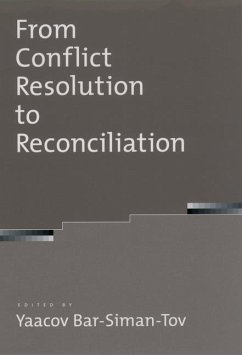This volume represents an important new step forward in the fields of conflict resolution and peace studies. Its essays argue that, while conflict resolution is well equipped to bring about temporary settlements and brief periods of peace in volatile situations, conventional conflict resolution techniques are not capable of building long-term stability. Instead, the authors contend, practitioners of conflict resolution need to focus more on reconciliation (the restoration of confidence, friendship, and harmony between rivals) than on mere conflict resolution. Whereas traditional conflict resolution has focused primarily on halting quarrels with agreements between leaders on each side of a conflict, reconciliation techniques shift the focus in two ways. First, they take more of a grassroots approach, building agreement among the members of rival communities, not only between leaders. Second, reconciliation takes a long-term view of dispute resolution. While the authors acknowledge that the role of traditional conflict resolution is important in stopping violence and tension, they argue that, in order to achieve stable peace, negotiators and practitioners of conflict resolution must focus much more on what is to be done after an agreement among leaders is reached.
Hinweis: Dieser Artikel kann nur an eine deutsche Lieferadresse ausgeliefert werden.
Hinweis: Dieser Artikel kann nur an eine deutsche Lieferadresse ausgeliefert werden.








